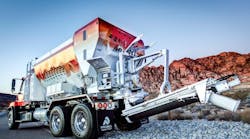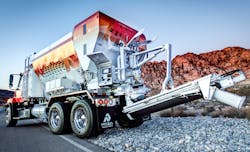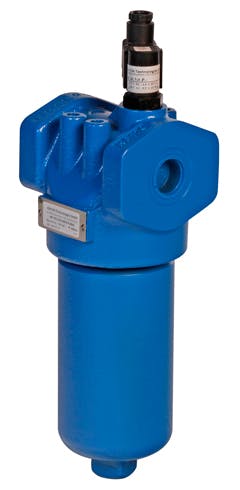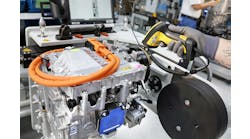Download the PDF of this article.
Most concrete mixers you see on the road are loaded with cement, aggregate, and water at a batch plant and mix these materials en route to a job site. Reimer Mixers, from ProAll International Mfg., Olds, AB, Canada, operates on an entirely different principle by bringing the ingredients to the site in separate bins and mixing them on the spot. Using this technology, they can deliver fresh concrete over long distances and to remote locations.
These mixers also can control the composition of the concrete precisely, including the addition of coloring and various other materials to achieve specific characteristics. Ingredients such as glass, steel, or synthetic or natural fibers can be added to reduce the permeability of the concrete and reduce water bleeding; to help control cracking during drying; and to improve pumpability, impact, abrasion, freeze-thaw, and shatter resistance. The fiber component of the fiber/concrete composite must be carefully controlled to achieve the desired properties.
Many types of chemical admixtures also may be added to improve other properties, such as air-entraining to improve freeze-thaw resistance; water reducing to produce a stronger concrete with more consistent setting times; retarding, which slows the setting rate of concrete in hot weather; and accelerating, which counteracts the effects of cold weather by increasing the rate of early strength development and reducing curing time. Plasticizers may be added to increase the fluidity of concrete, which must be added at the job site because their effect normally lasts for an hour or less. Other admixtures may include a corrosion-inhibiting chemical to retard corrosion of steel reinforcements.
ProAll Reimer Mixers use a sophisticated hydraulic control system to mix concrete components with precision at the job site instead of on the road.
Precision Control
The proportions of each admixture must be controlled carefully to achieve the desired concrete properties. ProAll Reimer Mixers provide precision control and keep all of the ingredients separate until they are combined at the jobsite. Coordinating the motions of the various augers, belts, and valves required to achieve the exact mix specified for each batch of concrete requires a sophisticated hydraulic control system with capabilities far beyond the simple directional valve and motor arrangement used on drum-type mixers. ProAll’s newest model, the Commander, uses a multi-valve hydraulic manifold to control the belt that conveys materials to the mixing auger in exact quantities, according to a program entered by touchscreen into the system’s computer control.
The hydraulic system consists of a pair of load-sensing piston pumps, one supplying 30 gpm for the mix-auger and the other supplying 20 gpm to the belt circuit. A gear-type charge pump is also included in the semi closed-loop system. Maximum operating pressure is 3,600 psi, with the mixing auger typically operating at 2,500 to 3,000 psi and the belt circuit at 1,500 psi. Control is provided by two banks of proportional valves mounted on low-profile manifolds.
Fluid Cleanliness
These proportional valves require effective fluid filtration to meet the company's field reliability goals. “With the sophistication of the automated controls on our new mixer and the use of much more sensitive electrohydraulic proportional valves, it is extremely critical that fluid cleanliness levels be maintained,” says ProAll engineer Curtis Steele. “If fluid cleanliness levels are not maintained and valve sticking or failure should occur, the equipment can become inoperable or behave erratically, which is not acceptable for producing quality concrete. The control system does monitor and check issues with outputs, but on the job site, the requirement for troubleshooting or maintenance can become very costly.”
The first batch of prototype Commander units included a pressure filter at the inlet of each valve manifold. These filters were chosen primarily on the basis of initial cost and offered a Beta value of 75.The beta ratio (also known as the filtration ratio) is a measure of a filter’s particle-capture efficiency. Its value rises with a filter’s efficiency, with a ratio of 75 corresponding to 98.7% efficiency and a ratio of 1,000 being 99.9% efficient.
“At first we were just trying to protect the valves from the crud that’s present in a system when it’s first installed,” Steele adds. “Diagnosing a valve that’s failed because it’s jammed with metal shavings is costly and time-consuming. But as the system got more and more sophisticated, it became obvious that we needed really effective filtration, and the economy filters just weren’t up to the task. The last straw was receiving a filter with a hole drilled through the threads, which naturally leaked as soon as it was installed.”
“So, after about four months of less-than-optimal performance, we contacted our local Eaton distributor, HyPower of Fort McMurray, Alberta,” continues Steele. “We were already using Eaton’s CharLynn motors for the mixing augers and belt drives, so Eaton’s people were familiar with the system and our needs.” HyPower recommended a pair of Eaton HP171-0011 pressure filters for the application. These are high-pressure, cartridge-type filters equipped with 7-µm elements with a Beta ratio of 1,000. HP series filters are rated to pressures up to 6,000 psi and maximum flow rates of 180 gpm. The filters are in-line mounted and have visual/electrical ∆P (differential pressure) indicators. ProAll has standardized on the Eaton HP171-0011 pressure filters for the 100 or more Reimer mixers they build each year, as well as for all planned future product additions.
Other contributing factors in the company’s filter choice were Eaton’s engineering support and its global service and distribution network, an important consideration because ProAll Reimer Mixers are used in more than 40 countries around the world.
The company also replaced the basic reservoir caps-style 40-μm breathers on the Commander hydraulic reservoirs with Eaton MBR110 Mobile-gate reservoir breathers. These units filter out particles and moisture before they can contaminate the oil and damage hydraulic system components. Reversible flow-through media allow moisture to exit the reservoir. Moisture is prevented from entering and is actually forced out with each flow cycle.
"We switched to the MBR110 for the same reason as the pressure filter, which is its much better particulate filtration for the air breather. The moisture expelling feature is also a nice bonus for our wet/humid customer locations," Steele concludes.
For more information on ProAll International Mfg. Inc., click here. Details on Eaton’s hydraulic filtration products and services can be found here.




